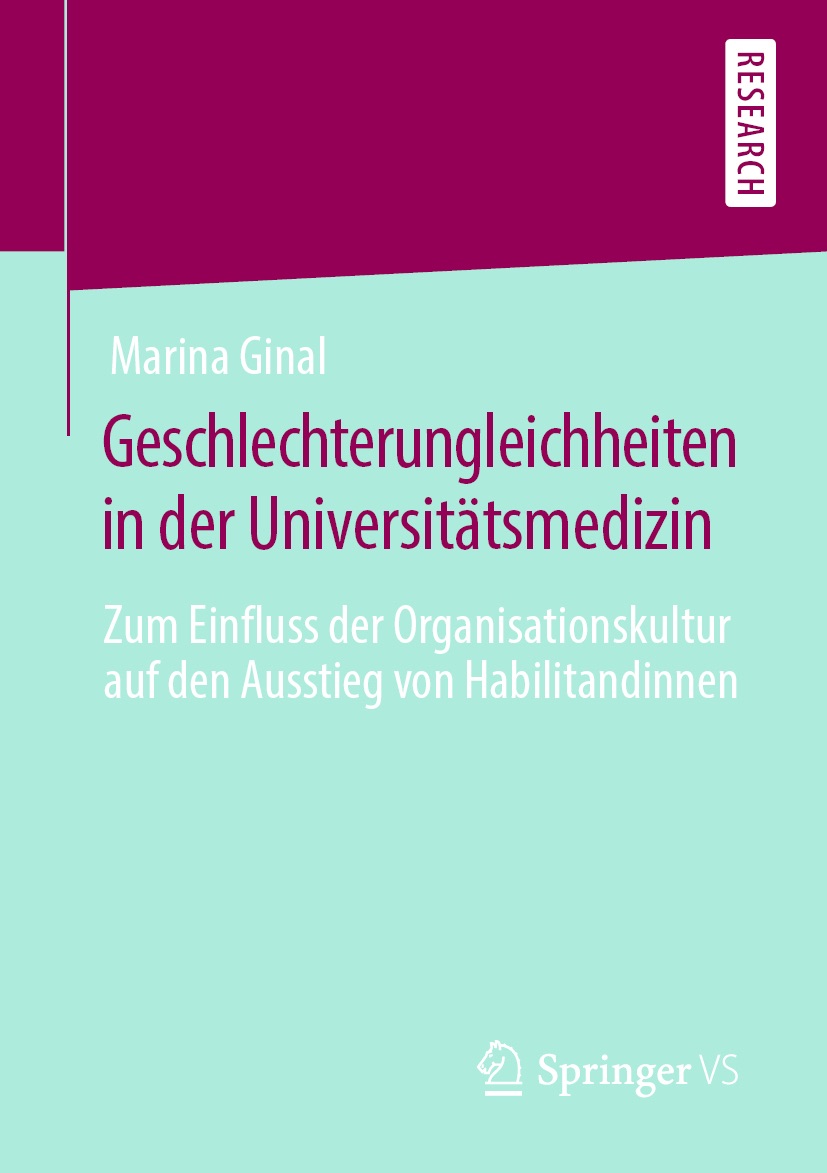Women in University Medicine: How "Glass Ceilings" are Individualized
Ginal, Marina: Geschlechterungleichheiten in der Universitätsmedizin. Zum Einfluss der Organisationskultur auf den Ausstieg von Habilitandinnen. Wiesbaden, Springer VS. 2019.
DOI:
https://doi.org/10.17169/ogj.2021.172Keywords:
University, Career, Power, Medicine, SubjectivationAbstract
Why do an above-average number of women leave university medicine during the habilitation phase and why does this leaving present itself as an individual predicament? Marina Ginal explores this in an interdisciplinary way using the example of the exit of female university physicians from the academic world. Characteristic hurdles on the way to a habilitation are discussed sociologically, psychologically, and socio-anthropologically and linked to the analysis of the mechanisms of hegemonically male-dominated organizational cultures, neoliberal developments of working conditions, and subjectification phenomena.
References
Antônôvsqî, Aaron (1997): Salutogenese. Zur Entmystifizierung der Gesundheit. Hg. v. Alexa Franke. Tübingen: dgvt-Verlag (Forum für Verhaltenstherapie und psychosoziale Praxis, Bd. 36).
Beaufaÿs, Sandra (2015): Die Freiheit arbeiten zu dürfen. Akademische Laufbahn und legitime Lebens-praxis. In: Beiträge zur Hochschulforschung 37 (3), 40–59.
Bourdieu, Pierre (1997): Die männliche Herrschaft. In: Dölling, Irene/Krais,Beate (Hg.): Ein alltägliches Spiel. Geschlechterkonstruktion in der sozialen Praxis. Frankfurt am Main: Suhrkamp, 153¬–217.
Bourdieu, Pierre (Hg.) (1992): Die verborgenen Mechanismen der Macht. Hamburg: VSA.
Bröckling, Ulrich (2007): Das unternehmerische Selbst. Soziologie einer Subjektivierungsform. 1. Aufl. Frankfurt am Main: Suhrkamp.
Butler, Judith (2012 [1991]): Das Unbehagen der Geschlechter. 1. Aufl. Frankfurt am Main: Suhrkamp
Center of Excellence Women and Science (CEWS) (2015): Frauenanteile an den W3-/C4- und ver-gleichbaren Professuren im internationalen Vergleich 2013. Hg. v. GESIS Leibniz Institut für Sozialwissenschaften. Mannheim.
Charmaz, Kathy (2014): Grounded Theory in Global Perspective: Reviews by International Resear-chers. In: Qualitative Inquiry. 20 (9), 1074–1084. doi: https://doi.org/10.1177/1077800414545235
Connell, Raewyn (2015): Der gemachte Mann. Konstruktion und Krise von Männlichkeiten. 4. Aufl. VS Verlag für Sozialwissenschaften. doi: https://doi.org/10.1007/978-3-531-19973-3
Connell, Raewyn (1993): The Big Picture: Masculinities in Recent World History. In: Theory and Socie-ty 22 (5), 597–623. doi: https://doi.org/10.1007/BF00993538
Deutscher Ärztinnenbund e.V. (DÄB) (Hg.) (2016): Medical Woman on Top. Dokumentation des An-teils von Frauen in Führungspositionen in 16 Fächern der deutschen Universitätsmedizin. Ber-lin: DÄB.
Foucault, Michel (2006): Sicherheit, Territorium, Bevölkerung. Geschichte der Gouvernementalität, Bd. 1. Frankfurt am Main: Suhrkamp.
Gemeinsame Wissenschaftskonferenz (GWK) (2017): Chancengleichheit in Wissenschaft und For-schung. 21. Fortschreibung des Datenmaterials (2015/2016) zu Frauen in Hochschulen und außerhochschulischen Forschungseinrichtungen. Bonn: GWK.
Kammler, Clemens/Parr, Rolf/Schneider, Ulrich Johannes/Reinhardt-Becker, Elke (2008): Foucault Handbuch. Leben, Werk, Wirkung. Stuttgart: Metzler.
Rose, Nikolas S. (2000): Das Regieren von unternehmerischen Individuen. In: BEIGEWUM (Beirat für gesellschafts-, wirtschafts- und umweltpolitische Alternativen) 2, 9-27.
Statistisches Bundesamt (Destatis) (2017): Studierende. Studienfach Medizin (Allgemein-Medizin) (Bil-dung, Forschung, Kultur). https://www.destatis.de/DE/ZahlenFakten/Indikatoren/LangeReihen/Bildung/lrbil05.html (01.08.2021).
Strauss, Anselm L./Corbin, Juliet M. (1996): Grounded Theory. Grundlagen qualitativer Sozialfor-schung. Weinheim: Beltz/Psychologie-Verlag-Union.

Downloads
Published
How to Cite
License
All contributions in Open Gender Journal are published under the Creative Commons Attribution 4.0 International license. You may freely make use of the corresponding texts in accordance to the conditions of the license (License contract, generally understandable version). There is no exclusive transfer of usage rights ("copyright transfer"). Open Gender Journal does not charge authors any costs for publication (so-called Article Processing Charges, APC) or submission (so-called Submission Charges). Authors are encouraged to share their contributions in other places, such as repositories.












